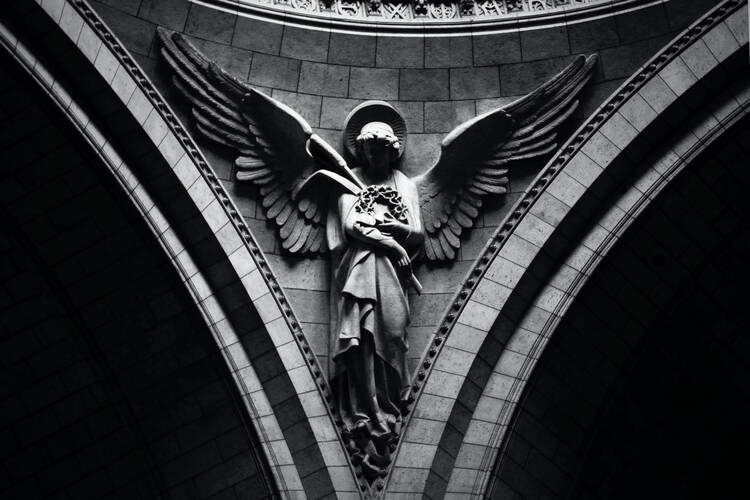A Reflection for the Feast of Our Lady of Guadalupe
The angel Gabriel was sent from God
to a town of Galilee called Nazareth,
to a virgin betrothed to a man named Joseph,
of the house of David,
and the virgin’s name was Mary.
And coming to her, he said,
“Hail, full of grace! The Lord is with you.”
But she was greatly troubled at what was said
and pondered what sort of greeting this might be. (Lk 1:26-38)
As a child, I was in awe of angels. For me, they broached the imagination like nothing else. I remember connecting with the Archangel Michael, who in artists’ renderings always seemed to be depicted wielding a sword and doing battle with the wicked. Famously, of course, in the Book of Revelations, Michael and his angels go to battle with Satan, who takes the form of a seven-headed dragon, and the angels defeat him, casting him out of Heaven. It is all very compelling stuff, especially for a little boy who very much appreciated that kind of visceral imagery (and was a big fan of Tolkien and fantasy fiction).
The Archangel Michael gets a lot of attention, I think because parents like to give their children his prayer card(the prayer is explicitly about keeping them safe from “the snares of the devil”). While Michael plays a big role both in the daily life of many Christians and in the biblical canon, as I get older, I can’t help but feel a greater connection to the Archangel Gabriel.
Gabriel’s role in the Bible is brief but memorable. He has the honor of delivering what might be the most important message of all time. It’s important enough that the event has its own name: the Annunciation. The passage from Luke says that Mary was “greatly troubled” by his arrival. I imagine if I were an ordinary teenage girl living in Nazareth, I too would be “greatly troubled” by news of such magnitude. But, imagine what it must have been like for Gabriel in that moment.
To her credit, Mary took the news with a lot more grace than I would have, but I like to think Gabriel’s delivery had a lot to do with it.
There must have been immense pressure on Gabriel to get everything right. As someone whose job largely depends on making sure news is delivered the right, accurate way, I can see a lot of myself in Gabriel. If I was in his position, I don’t know if I could’ve executed it as well as he did. I cannot imagine that Gabriel would have taken this task lightly; he must have understood it would take a deft hand to ensure that the news was delivered gently and effectively.
He begins with “Hail, full of grace! The Lord is with you.” Gabriel first reminds Mary that she is loved by God. Then he says, “Do not be afraid.” He reassures her before he goes on to deliver the news. When Mary asks him to clarify how her virgin birth can occur, Gabriel takes her through the process, even citing Elizabeth’s pregnancy as additional evidence. Gabriel’s message is comprehensive; in fact, he essentially has a conversation with Mary. He doesn’t just arrive and deliver the news and then leave. He stays to make sure she understands what is going on and that what is happening is a good and joyous thing.
That’s the mark of a good messenger, one who, like Gabriel, comes prepared. He knew what he had to say and he threaded the line expertly (he is God’s chief messenger for a reason). He treated Mary with kindness and patience, answering her questions and making sure she was not fearful. To her credit, Mary took the news with a lot more grace than I would have, but I like to think Gabriel’s delivery had a lot to do with it.








